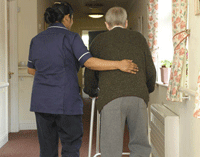
Nearly one in 10 social care staff is paid below the national minimum wage, a report by the Low Pay Commission has shown.
The social care workforce is among the lowest paid in the economy, with 9% of staff earning less than the minimum wage of £5.93 as of April 2010, according to the commission’s latest report.
The commission found the complexity of the social care pay system left many staff, and sometimes their employers, unsure of whether they had been paid at least the minimum wage. Some home care workers were paid per visit rather than per hour and received little or no reimbursement for travel costs, the report showed.
The commission repeated its recommendation that the commissioning policies of local authorities should reflect the actual costs of care. Adult social care is usually funded by the state but delivered through independent sector providers.
However, the commission admitted that, although the government has previously accepted similar recommendations, local authorities have failed to increase fees in line with mounting costs to providers, including the minimum wage.
Bridget Warr, chief executive of United Kingdom Homecare Association, said: “The commission has made this recommendation on a number of occasions and we see no evidence to suggest that the government is moving to implement it.”
Instead many social care providers are facing a cut in fees of up to 10%, and claim they cannot afford to pay staff more.
The National Care Association said its members were “dismayed” by business secretary Vince Cable’s announcement yesterday that the minimum wage would rise to £6.08 in October.
The association’s chairman, Nadra Ahmed, warned the increased wage rate could lead to job losses in the sector.
She said: “Our members would like to be able to pay their staff more, but a majority of those social care providers will currently be trying to come to terms with cuts to the fees paid to them by local government for care of between 1% and 10%.
“I am sure that we will see job losses and business failures because of this reckless attitude towards small and medium-sized businesses.”
The Dilnot Commission is due to report on the future funding of adult care in England in summer.
WHO BLAMES WHOM?
The issue of low pay in social care has existed for a long time, yet all parties appear to be passing the buck:
The Low Pay Commission blames central and local government. “We have made repeated recommendations to the government that the commissioning policies of local authorities and the NHS should reflect the actual costs of care, including the minimum wage” – Low Pay Commission Report on National Minimum Wage 2011.
Central government blames social care providers. “It is for local social care employers to determine the wage rates for their staff which should be based on the requirements of general employment legislation including national minimum wage” – a Department of Health spokesperson.
Providers blame local authorities. “[National Care Association members] would like to be able to pay their staff more but …a majority of those social care providers will be trying to come to terms with cuts to the fees paid to them by local government for care of between 1% and 10%” – Nadra Ahmed, chairman of the National Care Association.
Unions blame providers. “It is not good enough for firms to plead poverty. The minimum wage is the law of the land.” – Unison spokesperson.
What do you think? Join the debate on CareSpace
Keep up to date with the latest developments in social care. Sign up to our daily and weekly emails
Related articles
Editorial comment: social care should aspire to more than the minimum wage


 Bournemouth, Christchurch and Poole
Bournemouth, Christchurch and Poole  Hampshire County Council
Hampshire County Council  Lincolnshire County Council
Lincolnshire County Council  Norfolk County Council
Norfolk County Council  Northamptonshire Children’s Trust
Northamptonshire Children’s Trust  South Gloucestershire Council
South Gloucestershire Council  Wiltshire Council
Wiltshire Council  Wokingham Borough Council
Wokingham Borough Council  Children and young people with SEND are ‘valued and prioritised’ in Wiltshire, find inspectors
Children and young people with SEND are ‘valued and prioritised’ in Wiltshire, find inspectors  How specialist refugee teams benefit young people and social workers
How specialist refugee teams benefit young people and social workers  Podcast: returning to social work after becoming a first-time parent
Podcast: returning to social work after becoming a first-time parent  Podcast: would you work for an inadequate-rated service?
Podcast: would you work for an inadequate-rated service?  Family help: one local authority’s experience of the model
Family help: one local authority’s experience of the model  Workforce Insights – showcasing a selection of the sector’s top recruiters
Workforce Insights – showcasing a selection of the sector’s top recruiters 

 Facebook
Facebook X
X LinkedIn
LinkedIn Instagram
Instagram
Comments are closed.